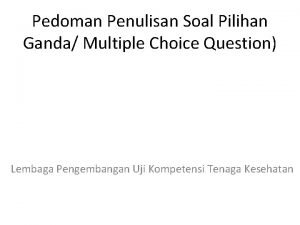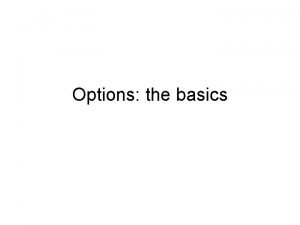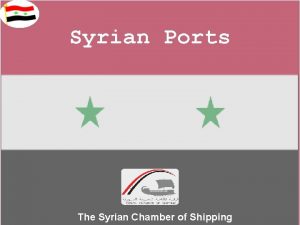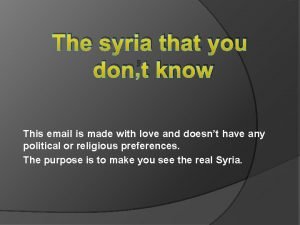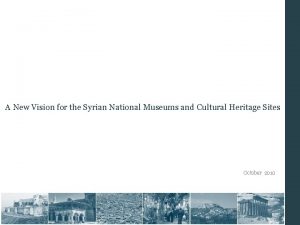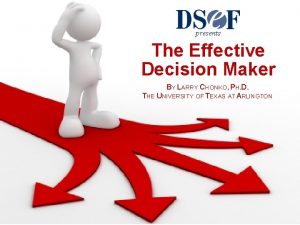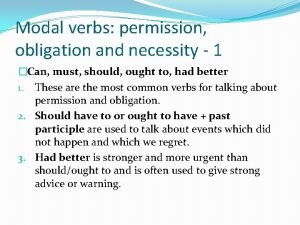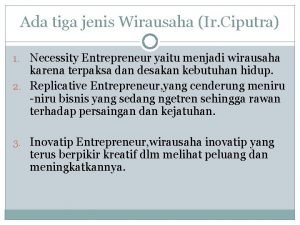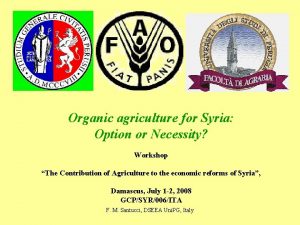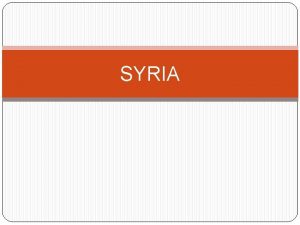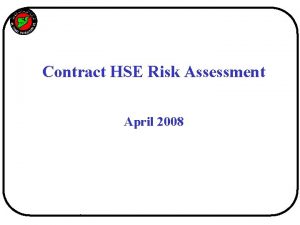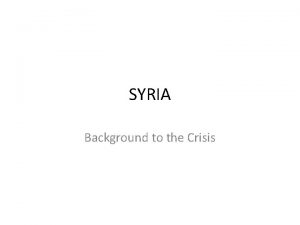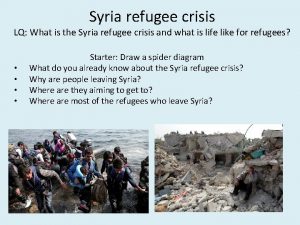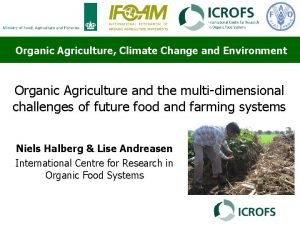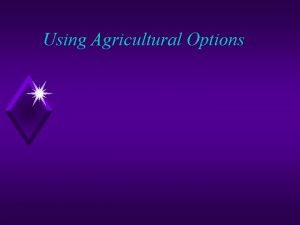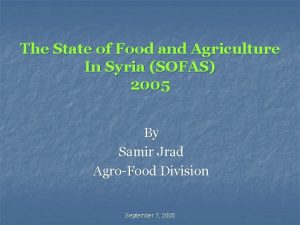Organic agriculture for Syria Option or Necessity Workshop












- Slides: 12

Organic agriculture for Syria: Option or Necessity? Workshop “The Contribution of Agriculture to the economic reforms of Syria”, Damascus, July 1 -2, 2008 GCP/SYR/006/ITA F. M. Santucci, DSEEA Uni. PG, Italy

Organic agriculture is growing. . F. M. Santucci, DSEEA Uni. PG, Italy 2

Organic agriculture in the Med F. M. Santucci, DSEEA Uni. PG, Italy 3

The demand is growing US about 48%, Europe about 50% F. M. Santucci, DSEEA Uni. PG, Italy 4

What is organic agriculture? • It is NOT the traditional agriculture practiced in the past • It is NOT the DO NOTHING agriculture • It is the fusion of the MOST advanced knowledge about life cycles and the respect for nature, for a sustainable longterm development. F. M. Santucci, DSEEA Uni. PG, Italy 5

IFOAM Guidelines Re-naturalization of the environment: shrubs, hedges, trees, canals, stonewalls, to reduce erosion, catch the rainfall, shelter predators and parasitoids, have a beautiful landscape; Appropriate techniques: rotations, mixed cropping, , agro-forestry, less mechanization, to limit weeds and parasites, save water and energy, reduce erosion and have a better N cycle; Green manure, compost; Develop biodiversity (animal and vegetal); No OGM; Production systems compatible with animal welfare and environment; Reduction of plastics and stop synthetic chemicals; Storage and processing, packaging as above; Fair trade and Intelligent consumption (pay more, eat less, spend the same, be healthier) F. M. Santucci, DSEEA Uni. PG, Italy 6

Should governments support organic agrifood systems? … Somebody says “no” • “Organic agriculture” exists since 1926 • For decades, there has been no legislation at all • Self – managed farmers associations and private firms were trusted by consumers • Norms (rules of production) and incentives have begun to appear only in the ’ 70 s F. M. Santucci, DSEEA Uni. PG, Italy 7

Somebody says “yes”… • Reduction of pollution and hazards • More attention to food safety and nutritional aspects health • Other public goods: biodiversity and animal welfare • Food security: organic systems are more resilient • Too much water and energy used by conventional agriculture • Too many hidden and open subsidies received by conventional agriculture • Domestic and international market opportunities certification F. M. Santucci, DSEEA Uni. PG, Italy 8

A logical process • for an integrated policy • Present situation of organic agri-food systems (production, processing, trade, research, services, etc) Objectives and strategies: where to be in 5 – 10 year time, and how to get there • Instruments and addressees: regulations and resources (grants, loans, subsidies) for the various stakeholders • Priorities • Follow up, monitoring and evaluation • Role of public institutions, of Civil Society Organizations and of private profit oriented firms F. M. Santucci, DSEEA Uni. PG, Italy 9

Areas of intervention • • Legislation • • Supply Certification and accreditation Applied research Extension, training for adult farmers and education at university Domestic demand Foreign trade (Reduction of contradictions with other policies) F. M. Santucci, DSEEA Uni. PG, Italy 10

Conclusions. . ? ? • Syria has started (FAO 011) a process that could lead far away • Ecological conditions (now and in future) require a more sustainable approach to production • Economic conditions impose a better use of public resources • Domestic and external markets demand more organic products • The engagement of Public Institutions should be strengthened • CSOs and private firms should be further encouraged • Links with other Institutions should be improved (Industry, Trade, Tourism, Education F. M. Health, Santucci, DSEEA Uni. PG, Italy, etc. ) 11

Thanks for your attention F. M. Santucci, DSEEA Uni. PG, Italy
 Question option 1 option 2
Question option 1 option 2 Option a option b
Option a option b Major sea ports in syria
Major sea ports in syria Twitter syria
Twitter syria Interesting facts about matthew the apostle
Interesting facts about matthew the apostle Write an email about syria in your notebook
Write an email about syria in your notebook New vision school syria
New vision school syria Extensive agriculture ap human geography definition
Extensive agriculture ap human geography definition Larry and peggy are making decisions
Larry and peggy are making decisions What is modal of permission
What is modal of permission Salah satu wirausaha menurut ir. ciputra adalah …
Salah satu wirausaha menurut ir. ciputra adalah … Netiquette
Netiquette What are the necessity of irrigation
What are the necessity of irrigation
